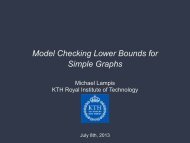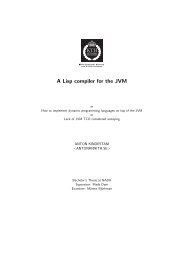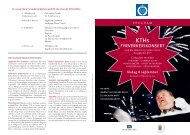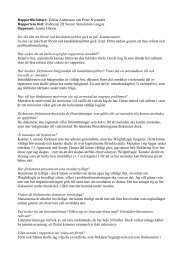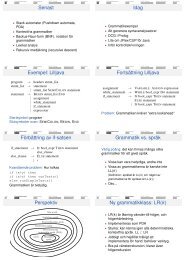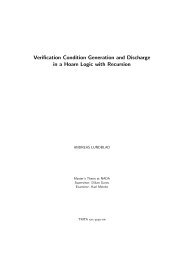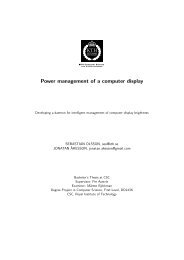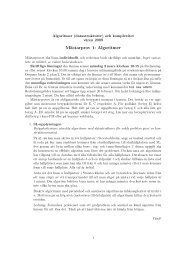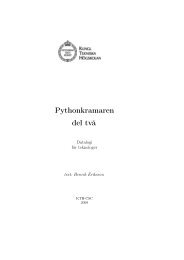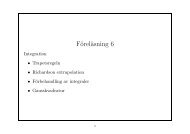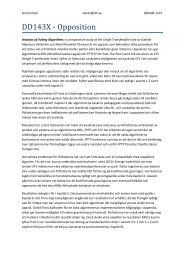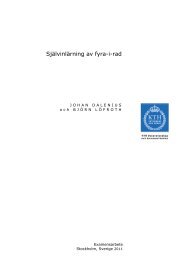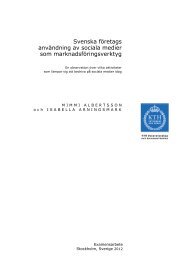Dr Faustus of Modern Physics - Department of Speech, Music and ...
Dr Faustus of Modern Physics - Department of Speech, Music and ...
Dr Faustus of Modern Physics - Department of Speech, Music and ...
Create successful ePaper yourself
Turn your PDF publications into a flip-book with our unique Google optimized e-Paper software.
88 CHAPTER 20. MAX BORN: I DID IT!<br />
himself, belonged to the skeptics until he died. Einstein, De Broglie,<br />
<strong>and</strong> Schrödinger have unceasingly stressed the unsatisfactory features <strong>of</strong><br />
quantum mechanics <strong>and</strong> called for a return to the concepts <strong>of</strong> classical,<br />
Newtonian physics while proposing ways in which this could be done<br />
without contradicting experimental facts. Such weighty views cannot<br />
be ignored. Niels Bohr has gone to a great deal <strong>of</strong> trouble to refute<br />
the objections. I, too, have ruminated upon them <strong>and</strong> believe I can<br />
make some contribution to the clarification <strong>of</strong> the position. The matter<br />
concerns the borderl<strong>and</strong> between physics <strong>and</strong> philosophy, will partake <strong>of</strong><br />
both history <strong>and</strong> philosophy, for which I must crave your indulgence.<br />
• However, a paper by Heisenberg 19, containing his celebrated uncertainty<br />
relationship, contributed more than the above-mentioned successes<br />
to the swift acceptance <strong>of</strong> the statistical interpretation <strong>of</strong> the<br />
-function. It was through this paper that the revolutionary character <strong>of</strong><br />
the new conception became clear. It showed that not only the determinism<br />
<strong>of</strong> classical physics must be ab<strong>and</strong>oned, but also the naive concept<br />
<strong>of</strong> reality which looked upon the particles <strong>of</strong> atomic physics as if they<br />
were very small grains <strong>of</strong> s<strong>and</strong>. At every instant a grain <strong>of</strong> s<strong>and</strong> has<br />
a definite position <strong>and</strong> velocity. This is not the case with an electron.<br />
If its position is determined with increasing accuracy, the possibility <strong>of</strong><br />
ascertaining the velocity becomes less <strong>and</strong> vice versa.<br />
• How does it come about then, that great scientists such as Einstein,<br />
Schrodinger, <strong>and</strong> De Broglie are nevertheless dissatisfied with the situation?<br />
Of course, all these objections are leveled not against the correctness<br />
<strong>of</strong> the formulae, but against their interpretation. Two closely<br />
knitted points <strong>of</strong> view are to be distinguished: the question <strong>of</strong> determinism<br />
<strong>and</strong> the question <strong>of</strong> reality.<br />
• This idea <strong>of</strong> complementarity is now regarded by most physicists as the<br />
key to the clear underst<strong>and</strong>ing <strong>of</strong> quantum processes. Bohr has generalized<br />
the idea to quite different fields <strong>of</strong> knowledge, e.g. the connection<br />
between consciousness <strong>and</strong> the brain, to the problem <strong>of</strong> free will, <strong>and</strong><br />
other basic problems <strong>of</strong> philosophy. To come now to the last point: can<br />
we call something with which the concepts <strong>of</strong> position <strong>and</strong> motion cannot<br />
be associated in the usual way, a thing, or a particle? And if not,<br />
what is the reality which our theory has been invented to describe?



